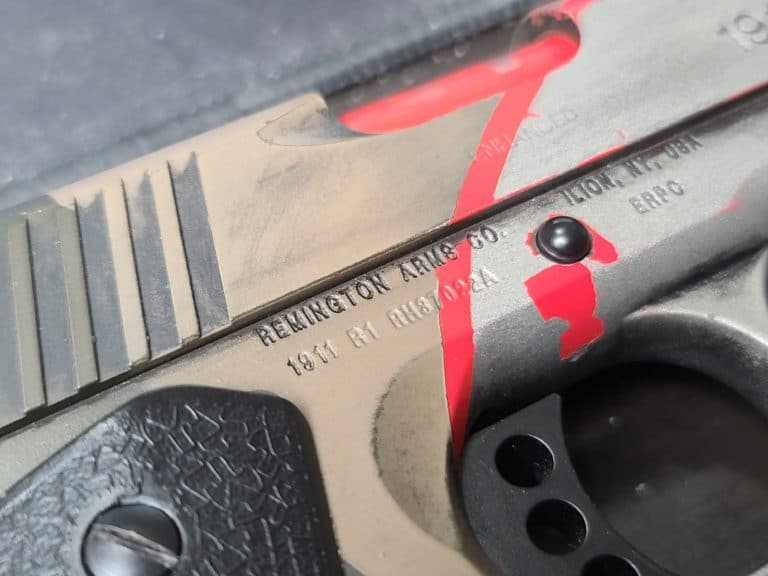A federal judge in West Virginia found the prohibition on possessing a gun with a filed-off serial number unconstitutional. It’s another federal regulation that’s fallen to the new Bruen test, but what was the reasoning behind the decision?
Judge Joseph R. Goodwin ruled against the ban on Wednesday in a criminal case. It’s another example of a law being struck without the involvement of a gun-rights group. In fact, it’s another example of a public defender winning on a Second Amendment argument in the wake of New York State Rifle and Pistol Association v. Bruen.
As required by the standard set in Bruen, Goodwin’s opinion in the case relied on the historical record. It did this despite Goodwin’s apparent distaste for the new test, a surprisingly common occurrence among the district court judges who’ve struck down federal gun provisions post-Bruen.
“Certainly, the usefulness of serial numbers in solving gun crimes makes Section 922(k) desirable for our society. But the Supreme Court no longer permits such an analysis,” Goodwin wrote. “Under Bruen, I am limited to considering whether Section 922(k) is ‘consistent with the Nation’s historical tradition of firearm regulation.'”
The main problem with the ban on the possession of guns with destroyed serial numbers is that it falls outside the scope of commercial regulation, according to Goodwin. Instead, he notes, it is the regulation of gun possession by individuals. So, while it may be constitutional to require manufacturers to engrave serial numbers into their guns or dealers to keep records of them, it is not constitutional to ban the possession of firearms that have had their serial numbers removed.
“Section 922(k) goes farther,” Goodwin wrote. “It criminalizes the mere possession of a firearm after a serial number is removed, obliterated, or altered in any way, whether or not the firearm is then placed into commerce.”
He noted Congress passed the regulation to make it easier for police to trace crime guns by preserving the markings that could help in that process. However, he said it is not difficult to imagine a scenario where an otherwise law-abiding gun owner could run afoul of the law without any criminal intent.
“Assume, for example, that a law-abiding citizen purchases a firearm from a sporting goods store,” he wrote. “At the time of the sale, that firearm complies with the commercial regulation that it bear a serial number. The law-abiding citizen takes the firearm home and removes the serial number. He has no ill intent and never takes any otherwise unlawful action with the firearm. Contrary to the Government’s argument that Section 922(k) does not amount to an ‘infringement’ on the law-abiding citizen’s Second Amendment right, the practical application is that while the law-abiding citizen’s possession of the firearm was originally legal, it became illegal only because the serial number was removed. He could be prosecuted federally for his possession of it. That is the definition of an infringement on one’s right to possess a firearm.”
He extrapolated the theoretical scenario by imagining the same gun being inherited by the original owner’s daughter.
“As it stands, Section 922(k) also makes her possession of the firearm illegal, despite the fact that it was legally purchased by her father and despite the fact that she was not the person who removed the serial number,” Goodwin said. “These scenarios make clear that Section 922(k) is far more than the mere commercial regulation the Government claims it to be. Rather, it is a blatant prohibition on possession.”
That puts the conduct being regulated squarely within the protection of the Second Amendment, which means the restriction is unconstitutional under the Bruen test unless the government can show it is part of a longstanding tradition. Since serialization of any kind wasn’t required until 1968, and the provision on destroying serial numbers wasn’t added until 1990, Goodwin said the only way it could be part of the historical tradition of American gun regulation is if there is an analogue from the early republic.
He argued there isn’t any evidence the Founders addressed the problem of gun violence by requiring serial numbers or other unique markings in order for people to possess guns despite the fact gun violence was a problem they dealt with. In fact, he said under Bruen the fact they dealt with that problem by other means is evidence the serial number requirement for possession is unconstitutional.
He went further and suggested the provision wouldn’t withstand scrutiny under the friendliest examination the Supreme Court allows.
“Even assuming the societal problem addressed by the regulation is ‘unprecedented,’ such that it would have been ‘unimaginable at the founding’ or is based on ‘dramatic technological changes,’ it is the Government’s burden to show that there were analogous regulations at the time to support Section 922(k)’s constitutionality,” Goodwin wrote. “In an attempt to meet its burden, the Government argues broadly that there is a historical tradition of ‘restricting the types of weapons that can be possessed,’ and that ‘there is a general historical practice of imposing ‘conditions and qualifications on the commercial sale of arms.'”
He rejected all of those arguments. He said the regulation in question isn’t of commercial conduct and removing a gun’s serial number doesn’t make it unusual and dangerous. He concluded the provision simply can’t stand under the Bruen standard.
“A firearm without a serial number in 1791 was certainly not considered dangerous or unusual compared to other firearms because serial numbers were not required or even commonly used at that time,” Goodwin wrote. “While I recognize there is an argument, not made by the Government here, that firearms with an obliterated serial number are likely to be used in violent crime and therefore a prohibition on their possession is desirable, that argument is the exact type of means-end reasoning the Supreme Court has forbidden me from considering. And the founders addressed the ‘societal problem’ of non-law-abiding citizens possessing firearms through ‘materially different means’—felon disarmament laws like Section 922(g)(1). Under Bruen, this is ‘evidence that [the] modern regulation is unconstitutional.'”
Judge Goodwin’s opinion is a very faithful implementation of the Supreme Court’s new standard for reviewing gun cases. Ironically, that may not be enough to convince higher federal courts or even the High Court itself. That’s because, as Goodwin himself acknowledges in his ruling, the Court has made a number of passing references to its intention not to cast doubt on commercial gun regulations or statutes aimed at suppressing the criminal use of guns despite not providing historical justification for the constitutionality of the laws.
“Although we do not undertake an exhaustive historical analysis today of the full scope of the Second Amendment, nothing in our opinion should be taken to cast doubt on longstanding prohibitions on the possession of firearms by felons and the mentally ill, or laws forbidding the carrying of firearms in sensitive places such as schools and government buildings, or laws imposing conditions and qualifications on the commercial sale of arms,” the Court said in 2008’s District of Columbia v. Heller.
And, as pro-gun scholar Eugene Volokh noted, the Bruen concurrence by Justices Bret Kavanaugh and John Roberts signals they are more open to gun laws designed to weed out criminal gun use. They defended gun-carry permitting requirements as constitutional so long as the standards are objective and less-than-intrusive.
“Because these licensing regimes do not require applicants to show an atypical need for armed self-defense, they do not necessarily prevent ‘law-abiding, responsible citizens’ from exercising their Second Amendment right to public carry,” Kavanaugh wrote. “Rather, it appears that these shall-issue regimes, which often require applicants to undergo a background check or pass a firearms safety course, are designed to ensure only that those bearing arms in the jurisdiction are, in fact, ‘law-abiding, responsible citizens.'”
Of course, the argument that the ban on the possession of guns with destroyed serial numbers is constitutional because the benefit of tracking guns used in crimes outweighs the burden on Americans’ gun rights is exactly the kind of balancing test the Supreme Court just rejected. So, it’s hard to imagine them going down that road again in this case.







5 Responses
The judges reasoning as it pertains to the theoretical daughter inheriting the gun where the serial number was removed, is precisely the problem with a lot of modern-day gun laws. Most modern-day gun laws criminalize the offender. Many times the offense is really a civil matter.
For example, I live in Illinois and have to have an FOID card whenever I am possessing any firearm or ammunition. Let’s say I go on a hunting trip, which I am known to do, and I put my shotgun and ammunition in the rear of my SUV.
Sometime during the trip I spill a box of shotgun shells in the back (something that has happened) and some of them escape my view as I clean up the back of the SUV. Sometime later my wife drives the car. She does not have an FOID card issued in Illinois and she is pulled over by a police officer for running a stop sign. For whatever reason the police officer decides to search the car and finds a couple shotgun shells in the back of the SUV. Now she is guilty of a misdemeanor at the very least for possessing ammunition without an FOID card. If this was simply a civil offense akin to a parking ticket, the police officer could have issued her a ticket with an attached fine and she would’ve been on her way.
The FOID conundrum also exists inside of the home. For example, let’s say an intruder gets into your house and your non-FOID possessing relative uses one of your guns to defend themselves. I have been told in various gun training classes that in Illinois one of the first things that police officers ask for as part of their investigation is the FOID card of the person who used the gun.
Notwithstanding that the FOID card as it is currently administered in Illinois is probably unconstitutional, the point is that using a gun in self-defense in your own home should not be a criminally liable offense.
This is what bothers a lot of gun owners, myself included, and that is, small offenses that are really just oversights, are criminally prosecuted. That is the main reason we are against just about any gun control measure because they end up being considered criminal offenses costing thousands of dollars to defend with potential jail time.
Liberals who want to have reasonable gun control should rethink what the penalties are for small minor offenses. Making many of these technical issues into civil offenses as opposed to criminal ones may go along way in solving some of today’s problems without making the law abiding criminally liable.
Yes, I think that’s really good insight. In my personal opinion, however much that matters to anyone, I would say the situations you and the judge describe ought not be infractions at all since they don’t involve any criminal intent.
Many modern laws seek to eliminate the need to prove some kind of criminal intent because it’s easier for law enforcement if they don’t have that requirement. But, in my view at least, that’s not a good tradeoff.
Agreed. I tend to use the old liberal argument about licensing cars and drivers as it pertains to guns. When they say “You need a license to operate a car, why not a gun?” And my response has been: Despite some limitations regarding speed, direction and parking, I am free to take my car wherever I want, why not my gun? And if I perform some infraction where no one is hurt or threatened in my car I get a ticket. Yet if I perform a similar type of infraction with my gun, society wants me in jail.
Agreed that intent should be key.
I have a hard time seeing any problem with Judge Goodwin’s opinion. It’s not only faithful to Bruen and the Second Amendment—it’s also respectful of the constitution’s limits on federal powers (notwithstanding the horribly flawed 2005 Gonzales v. Raich decision).
Like so many recent gun controls, 18 U.S.C. § 922(k) simply goes too far by criminalizing the mere possession of a firearm with a defaced serial number. To make matters worse, it’s a federal felony, which means mandatory prison time plus a lifetime ban on future firearm possession.
We got along just fine for nearly 200 years without any requirement for serial numbers on firearms, and this law is even more recent, having been passed in 1990. Anyone seriously suggesting that law enforcement will be hobbled without these sorts of draconian provisions has probably been watching too many CSI-style TV programs.
If the Second Amendment is going to stand for anything, then at least some of the current federal gun laws are going to have to go.
Yea, I think his analysis was pretty well in line with what Bruen requires.